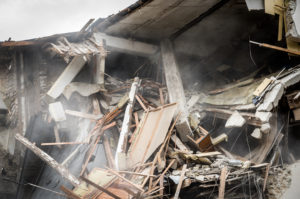5-minute read
There was never a doubt the lawsuits would be coming, not as we watched in horror as the Champlain Towers South condo in south Florida slumped and then crumbled in a nightmarish scene broadcast again and again across media platforms worldwide.
The class-action filed against the Champlain Towers South Condo Association alleges it failed to “protect and safeguard” the lives and property of the residents of the 13-story Surfside building “by knowingly disregarding standard safety principles, despite obvious risks.”
That’s a lot to allege and, despite the tragic loss of life, won’t be a slam-dunk to prove in court.

Still.
Long after the search and rescue efforts at the condo building is over, accountability and liability will remain in the spotlight, and there will be a price to pay.
Items to keep in mind
The No. 1 lesson for any homeowners’ association may sound obvious: do all you can to avoid deferring maintenance. After all, your insurance company could decide it won’t cover your claim if you failed to properly maintain your building.
Here are six more items all home or condo associations will want to consider:
- Get a reserve study done. This is an invaluable long-term planning tool that will help your board anticipate and prepare for major repair and replacement projects. In some states, updates to reserve studies must be done every three years. That’s a pretty good span of time between studies, so waiting much longer really may be asking for trouble.
- Get regular inspections completed, even if they’re not mandated. A reserve study is an involved, deep look that often includes use of advanced X-ray technology to allow engineers to see what they cannot with the naked eye. But don’t put off regular inspections. They’re a good way to spot potential issues before they become more serious. They’re also a good way to shield association board from liability should disaster strike.
- Don’t count on the owners. Common areas are the association’s responsibility, that’s a well-accepted fact. But there are other areas you’ll want to keep an eye on, especially balconies in high-rise condos. Owners often don’t know what’s safe, what’s not, or what to do. Hire the inspectors to do walk-throughs and charge back the cost to the owner. If your association agreements don’t allow that, make it a common expense.
- Listen to the professionals and act quickly. The Champlain Towers association received an engineering report with warnings about structural damage in 2018 but the bulk of a $12 million repair project had yet to commence before the collapse. Even without hindsight, it would seem that a more immediate response would have been appropriate. “Though some of this damage is minor, most of the concrete deterioration needs to be repaired in a timely fashion,” the engineers said in their report. There’s still a lot to learn about what happened in Surfside, but waiting more than two years falls outside most definitions of “timely.”
- Keep a close eye on your reserve fund. Ideally, a 100% funded reserve is the best option. It means you can cover all of the anticipated costs based on the findings of a reserve study. The reality, however, is that many HOA reserve funds are underfunded. That leaves boards scrambling to find the money to pay for these expenses. They might suddenly and sharply increase association dues, or worse, put off repairs. The Champlain Towers association had taken out a line of credit to pay for the repairs needed there.
- Hire an HOA manager. Using owner volunteers to manage an HOA may seem like the best way to go, especially because doing so won’t place an extra financial burden on the community. Yet depending on the size of the community, the demands can quickly get out of hand. The bigger your community, the more of everything there is to manage: bills, complaints, regulations, maintenance, collection issues, etc. A lot of the work HOAs need to do requires some familiarity with laws and liability, not just basic home and lawn maintenance. Outside help can save owners money, worry and leaves it to others, rather than neighbors, to ensure everyone follows the rules.
The Mahoney Group, based in Mesa, Ariz., is one of the largest independent insurance and employee benefits brokerages in the nation. For more information about HOA insurance coverage, contact us online or call 480-730-4920.
This article is not intended to be exhaustive nor should any discussion or opinions be construed as legal advice. Readers should contact legal counsel or an insurance professional for appropriate advice.
